Met-Chem manufactures Filter Cloths for all makes and models of filter presses. Met-Chem offers a wide variety of sizes, materials, and weaves for your filter press. Our in-house sewing department can manufacturer any filter cloth to fit any filter press. All our filter cloths are made in the USA at our Cleveland, Ohio facility.
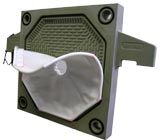
Met-Chem sewing department is a custom cut and sew shop. We have a large sewing factory on our premises to make any type of filter bag, Filter Press Cloths or Filter Media, to your specifications. Applications include liquid, air or gas. Our deliveries are always within a few days since we stock many of the textiles required for these applications.
With having an in-house sewing department, this allows us to ship smaller orders in 1 day. We keep part of our plant available to handle these orders from start to finish. This includes laying out the fabric, cutting the bags from patterns, sewing and shipping the finished product. By having trained people in this area to “do the whole job”, we can avoid the production line requirement that large orders face. This enables us to make and ship all of our smaller to medium size bag orders the day they are received or very soon afterward.
Please contact sales to discuss your specific needs.
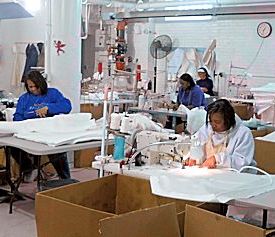

Non-Gasketed Cloths come lined with a latex coating along the outer edge to ensure a tight seal.
Met-Chem understands the time constraints put onto manufacturing facilities and there is often not enough time in the day or enough manpower available to perform maintenance such as Replacing the Filter Press Cloths in your filter press. If you do not have the time or manpower to change your filter press cloths, there are several options available to help with this issue
First, a set of plates, as small as 2, can be purchased from Met-Chem. This will allow you to swap out old plates with these new plates 2 at a time. This will allow you to take your time to change these two cloths. Once these two are done they can be swapped out for the next two that need done. This is performed until all the plates have been reclothed.
A second option is to send the filter press plates to Met-Chem to have them professionally changed be our Met-Chem Installation Team. The filter press plates will have their old cloths and gaskets removed. The plates will be given a thorough acid wash and then power washed. We will then install the new cloths and new gaskets. If you are able to have your filter press shutdown for a few days we can quickly perform the work on your plates and get them back ASAP. If you are not able to be down for a few days then we can provide you with either a full set of new plates or a partial set of filter press plates. As with option one, we will provide new plates with cloths and gaskets in the quantity that works for your timeline and budget. Once the new plates are installed in your filter press you will send your old plates to Met-Chem and we will perform the work on your current plates and send back once completed.
Whatever your needs are regarding filter presses Met-Chem has an option that can help. Please Contact Our Sales Team for assistance
We are also very proud of our testing lab that helps to determine the right fabric for your specific requirements. We have a Frazier Permeability Tester. This is the industrial method for true testing of a fabric’s porosity to determine it’s filtering characteristics. It enables us to determine the permeability of any filter fabric. This tests the CFM which is the cubic foot per minute of air permeability at a .5” pressure drop.
At Met-Chem and our sister company, Murray Fabrics, have dramatically upscaled our production of surgical gown cuffs due to the Coronavirus pandemic. The cuffs come on a roll, and you are able to cut it to the length you need. We are still taking orders, please call Murray Fabrics at 216-881-4041 or email us at info@murrayfabrics.com.
Thank you for making PPE(Personal Protective Equipment) for nurses, doctors, and other medical personnel.
Fabric Type | pH range | Temperature | Characteristics |
|---|---|---|---|
| Polypropylene | 2-12 | up to 190° F | Offers good tensile strength and abrasion resistance. They perform well in organic and mineral acids, solvents and alkalies. Polypropylene is attacked by nitric and chlorosulphonic acids, sodium and potassium hydroxide at high temperatures and concentrations. |
| Polyester | 2-9 | up to 325° F | Offers good resistance to most acids, oxidizing agents and organic solvents. Concentrated sulfuric and nitric acids are the exception. Polyesters are dissolved by alkalies at high concentrations. |
| Nylon | 2-8 | up to 250° F | Good tensile strength and alkali resistance but are degraded by mineral acids and oxidizing agents. This reaction is accelerated at high concentrations and temperatures. |
| Cotton | 3-10 | up to 225° F | Good abrasion resistance and mechanical strength. It is, however, subject to rot, mildew, and shrinkage. |
| Acrylic | 4-5 *Subject to other variables | 260 to 280°F / 125 to 135°C | The resistance of acrylic fibers is excellent in organic solvents, good in oxidizing agents, minerals and organic acids and fair in alkali. Will dissolve in sulfuric acid concentrations |
| Nomex* | 2 – 12 | up to 425°F | Resist attack by mild acids, mild alkalies, and most hydrocarbons. Resistance to sulfur oxides above the acid dew point at temperatures above 300°F is better than polyester. Flex resistance is excellent. |
| Kevlar* | 5-7 | Max operating temp 300-500°F / 149-260°C (Does not melt until over 800°F / 427°C) | Kevlar (aramid yarn) is chemically stable under a wide variety of exposure conditions; however, certain strong acids and bases can cause degradation, particularly over long periods of time and at elevated temperatures. |
Fiber | Tensile Strength | Abrasion Resistance | Chemical Resistance | Deg F | Deg C | PH | |||
Acid | Alkali | Cont. | Surge | Cont. | Surge | ||||
| Polypropylene | Excellent | Good | Excellent | Excellent | 190 | 190 | 90 | 90 | 2-12 |
| Polyester | Excellent | Excellent | Good | Fair | 275 | 325 | 135 | 150 | 2-7 |
| Nylon | Excellent | Excellent | Poor | Excellent | 200 | 250 | 90 | 120 | 2-8 |
| Cotton | Good | Average | Poor | Excellent | 180 | 225 | 80 | 105 | 3-10 |
| Acrylic | VeryGood | Average | VeryGood | Fair | 260 | 280 | 125 | 135 | |
| Nomex* | VeryGood | VeryGood | Fair | Good | 400 | 425 | 200 | 215 | 2-12 |
| Kevlar* | Excellent | Excellent | Fair | Good | 300 | 500 | 149 | 260 | 5-7 |
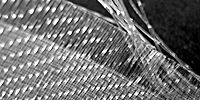
Fabrics woven from monofilament yarns are recommended for the wet filtration of coarse crystals, fibrous pulps and other free filtering materials. A monofilament fabric possesses minimum blinding, good cleaning, and excellent cake discharge characteristics.
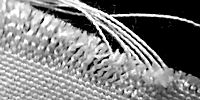
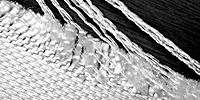
Combining and mixing two or more of the staple, multifilament and monofilament fibers available for finer filtration and better cake release
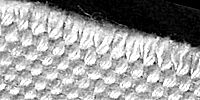
The short fibers twisted and spun into yarns and woven into fabrics have the advantage of being a very permeable yarn. Filtration takes place through the yarn as well as the interweave spaces. Thus, higher flow rates can be obtained with maximum retention of solids.
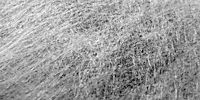
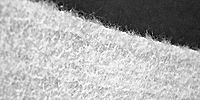
Needled felts are manufactured by mechanically bonding layers of staple fibers to a base cloth by means of a fiber locking machine. This construction provides maximum efficiency with lower pressure drops and higher flow rates than woven fabrics. For dust collection purposes felt fabrics are generally thicker and heavier than woven fabrics.
Met-Chem, Inc.
837 East 79th St.
Cleveland, OH 44103
Phone: (216) 881-7900
Email: info@metchem.com
Copyright © Met-Chem, Inc